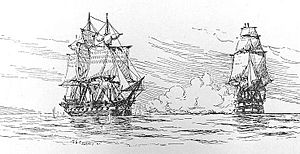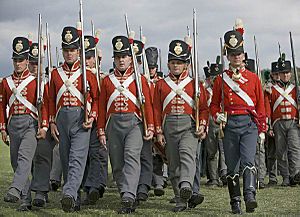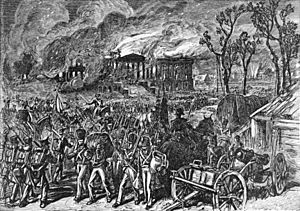Opposition to the War of 1812 in Britain facts for kids
The War of 1812 was a conflict between the United States and Great Britain. Even before it officially started, many people in Britain didn't want this war. They had economic reasons, like worrying about trade, and moral reasons. However, the British government continued the war because they were also fighting Napoleon in Europe. As Britain's economy struggled and the war with France dragged on, more and more people in Britain disliked the idea of fighting another war. The burning of the White House in America also made many people in Britain upset about the war.
Contents
Why People Opposed the War
Economic Worries Before the War
The first signs of people not wanting the War of 1812 appeared in 1807. This was when the Royal Navy ship HMS Leopard clashed with the American ship USS Chesapeake. Many people thought this incident would lead to war.
A popular newspaper called The Morning Chronicle spoke out strongly against the idea of war. It published letters from someone who warned that fighting America would force the young country to make its own goods. This would hurt British factories and businesses. Most of the reasons people opposed the war were about money and trade. America was a big customer for British goods. It also supplied important raw materials, like wood and cotton. For example, the U.S. provided more than half of Britain's cotton before the War of 1812.
The Orders in Council Problem
A big reason for British opposition was something called the Orders in Council. These were rules made by Britain to stop France from trading with other countries. This was part of Britain's larger naval war against France. However, these rules also affected American traders. Americans believed they should be able to trade with both Britain and France because they were a neutral country.
While some in Britain didn't care about American complaints, many others understood why Americans were angry. Almost every British industry was affected by the Orders in Council. America was a huge supplier and customer for Britain's economy. Industries like textiles and manufacturing suffered a lot. Financial businesses also took a big hit. Cities like Liverpool, which depended heavily on American shipping, felt the loss of trade. Some newspapers, like the Glasgow Journal, even accused Parliament of keeping the rules to make money by selling special trading permits. By the spring of 1812, Parliament saw how much the rules were hurting the economy. They decided to stop the Orders in Council.
Tired of War with France
Much of the opposition to the War of 1812 came from a general dislike of war in Britain. Britain had been fighting France since 1793, with only a short break in 1802. The Napoleonic Wars seemed like they would never end. By 1812, Britain was spending almost 25% of its total economic output (GDP) on defense.
The long wars affected everyday British people. Britain became the most militarized country in the world. About 20% of all men ended up in the military. This was a much higher rate than even France, Britain's main enemy. The number of soldiers who died also increased greatly. This made the British public even angrier.
For those not in the military, the war hit their wallets. By 1812, almost 35% of people's income went to taxes. This was a much higher tax rate than in earlier wars. Because of all this, many in Britain were upset about starting another war. Some, like William Cobbett of the Weekly Register newspaper, argued that the war was just a way for companies to make more money. Groups like the Friends of Peace formed to ask for peace with both France and America.
Opposition During the War
Upset About the Burning of Washington
The last major reason for opposition to the War of 1812 happened in August 1814. British forces burned the White House and other public buildings in Washington, D.C. This was done to get back at the Americans for destroying Port Dover in Canada.
Many people in Britain argued that America should be treated with the same respect as European countries during wartime. Burning a foreign capital city was not usually done in Europe. Others worried it might weaken Britain's position in future peace talks, like at the Congress of Vienna. For many in Britain, burning the White House felt morally wrong. They saw it as a public building, not a fort or a military camp. The continued anger about this decision helped Parliament decide to speed up peace talks. These talks led to the Treaty of Ghent in December 1814, which ended the war.
 | Bessie Coleman |
 | Spann Watson |
 | Jill E. Brown |
 | Sherman W. White |




